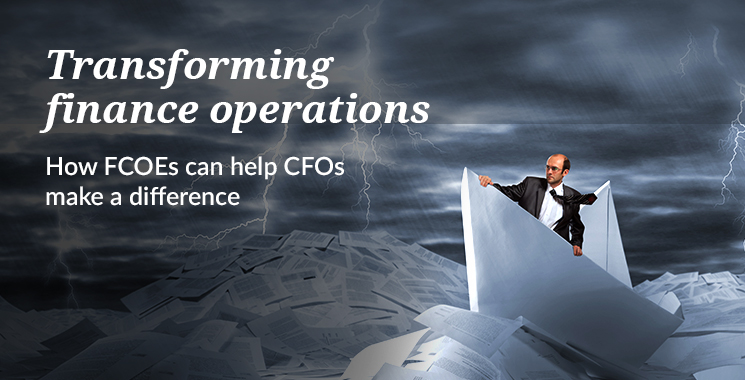Topics: Finance and Accounting Transformation
Posted on July 18, 2018
Written By QX Global Group

As organisations struggle to adapt to a dynamic market that forces frequent course corrections, finance leaders are expected to assume the mantle of a strategic advisor and support enterprise goals of innovation, risk mitigation and strategy formulation. To play this role successfully, CFOs and other finance leaders need a highly efficient Financial Planning and Analysis (FPA) function, in addition to streamlining and consolidating F&A operations.
A Finance Centre of Excellence (FCOE) can be instrumental in bringing together a variety of skillsets, standards, processes and technologies. By injecting best practices across finance functions & bringing consistency, an FCOE can help centralise all the organisational information and knowledge, paving the way for setting up a single source for all trusted information. Streamlined functions and access to accurate data can help the finance leaders play their part in driving positive business outcomes and improving the bottom line.
Looking beyond the buzzword, a Centre of Excellence is a group of people, often excelling in separate disciplines or functions, coming together to formulate and implement best practices. In simpler terms, it could refer to any department that focuses on improving its knowledge base and proficiency, with the primary goal of sharing its expertise with all the other activity centres within the organisation.
In this context, an FCOE would consist of finance & accounting process experts, IT specialists and other relevant stakeholders. These people come together to elevate the effectiveness of a finance function, with the aim of eventually improving business outcomes. Essentially, the group would focus on defining, documenting and implementing a common set of best practices, processes and standards across the finance and accounting departments.
CFOs can expect to derive numerous benefits from the establishment of a successful FCOE:
The sheer number of important finance functions make the task of building an FCOE daunting. On one hand, it is important to include as many functions as possible, while on the other hand it may simply not be feasible to deploy resources for each function. In such cases, it is advisable to identify and prioritise the most critical functions and follow a phase-wise approach. For CFOs and finance leaders embarking on the journey to setting up an FCOE from scratch, the following steps are important:
1) Get stakeholder buy-in and weave into the strategic plan: At the end of the day, the success of your COE will depend on how invested all the stakeholders are – ranging from the top management to the subject matter experts, IT experts and others. By highlighting the potential benefits of the COE in relation to the strategic business plan, you can get the leadership support. Don’t forget to convey the benefits clearly to all the other stakeholders involved, to get enthusiastic support for the initiative.
2) Conduct a holistic and value-based review: Review your organisational goals, the role played by the finance department and the expectations from your department. For instance, if the organisation requires improved budgeting & forecasting, expects innovative ideas for cost reduction, and needs more accurate reporting more frequently, it may be imperative to centralise process, consolidate information and eliminate redundancies. This exercise will help you determine specific expectations and desired outcomes for the FCOE.
3) Assess and identify effective solutions: Based on the challenges you have identified, the solution can be found in improved technology in the form of automation, injection of best practices across the organisation, process innovation, or a combination of these. The next step is to determine the best path to achieve the solution – set up internal teams, implement new systems or technologies, or seek the support of a service provider. Based on your choice, highlight the specific benefits that can be achieved via the creation of the FCOE.
4) Empower the team: Once the core focus areas of the COE and the path to achieving specific objectives are clear, build a team of experts from different fields to drive the transformation process.
There’s more than one way to achieve finance & accounting excellence – many organisations have successfully used the expertise of shared services providers or captive centres to create FCOEs and drive finance process transformation. On the other hand, several organisations have realised the need to set up separate COEs, with a focus on innovation, outside the well-defined but limited setup of shared services centres.
As the finance & accounts outsourcing model has outgrown it’s ‘lift and shift’ avatar to provide finance transformation services, some organisations are also looking at leveraging long-term outsourcing partnerships to set up offshore FCOEs for fostering innovation and speeding up their F&A transformation efforts.
If you’d like to discuss the topic in greater detail, please get in touch with Nishant Kumar on [email protected].
Originally published Jul 18, 2018 12:07:20, updated Apr 07 2025
Topics: Finance and Accounting Transformation